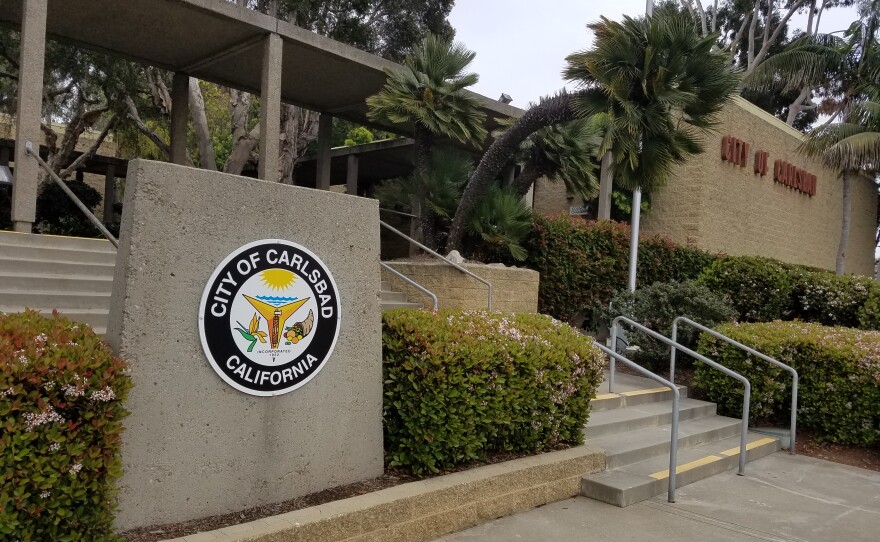The Carlsbad City Council gets a lot of emails. They’re typically from concerned constituents about upcoming meetings.
But in the lead-up to the July 15 council meeting, there was a noticeable uptick. The council received more than 25 emails, all about the same agenda item. The item wasn’t particularly high stakes. It was a procedural issue about applications that were outside the previously-approved housing plan. Many of the emails contained similar wording, urging the council to keep the housing plan the same.
At the meeting itself, Councilmember Priya Bhat-Patel brought up the surge in community engagement. Along with the majority of the council, she voted for the motion.
“Sometimes a few dozen emails may make the difference in terms of what the decision ends up being,” Bhat-Patel said.
So what was behind the sudden deluge of community input? The similar wording, sometimes copied and pasted with quotation marks included, was a part of a post in a Facebook group, encouraging people to send emails to the council.
City-specific Facebook groups are used by over half of young adults between the ages of 14 and 34 as a local news source, according to a recent study by the Radio Television Digital News Association. They tend to be a more accessible way for people to get a pulse on local news, rather than reading through city council agendas or combing through public records.
And sending emails or getting involved on social media is much easier than attending a council meeting in person. Barriers like work, childcare, public transportation and the effort it takes to find information about where and when meetings take place can all prevent constituents from showing up. But what they can do is send an email or check their phone for the latest news — provided that information is accurate.
Wake Up Carlsbad originally started in 2015, and has more than 5,000 members today, according to group administrators Kris Wright and Diane Bedrosian. It focuses on local news in the Carlsbad area. Four administrators oversee the group, but anyone can post in it, provided they are a member.
Bedrosian, who helped start the group, sees it as a response to the erosion of local news. Although some news outlets cover the entire county, they are often unable to cover every council meeting or every hyperlocal story.
Katherine Haenschen is an assistant professor of political science and communication studies at Northeastern University. She studies the way digital communication can affect political participation.
“It is increasingly hard in many places in this country to get adequate coverage of local government,” Haenschen said. “It's not a surprise to see groups emerge to try and provide some of that information and fill that vacuum.”
But there’s a small problem with this community-centered model: the threat of misinformation.
As it turns out, that agenda item that the Carlsbad City Council received so many emails about wasn’t actually about amending the housing plan — it was about how to more efficiently process applications that didn’t comply with it. So the deluge of emails the council received were about a change that wasn’t actually going to happen.
Wright did see the post, and noticed the disconnect between the agenda item’s description and the information in the post. She investigated further, reaching out to the city for more information, and spoke with a city manager, who clarified that the agenda item wasn’t an amendment to the housing plan. She then passed the correction along to the group.
But according to Haenschen, once someone has been misinformed, it’s difficult to get them to accept the real facts. And when people spread false information or disinformation purposely, that can be even more damaging.
“It's still going to stick around in your head,” Haenschen said. “It's called the belief echo. It's still there. So you can't bring someone back to zero once you've intentionally misinformed them.”
The Wake Up Carlsbad administrators try to fact check every post, but with thousands of members and growing interest, that can be a tall order. Some admins had full-time jobs until recently, making it difficult to fact check as fast as they might like.
There’s definitely a bright side, though.
“If someone is posting misinformation in a group, that is potentially a great place for someone to step in and call them in,“ Haenschen said. “There is some pretty good evidence that getting pushback on misinformation from a friend or a member of your network is a good way to get people to at least receive it.”
Another responsibility of moderators is balancing encouraging dialogue without members getting angry and calling people names.
“Being an admin, it's like stopping your brother and sister from fighting,” Wright said. “You just step in there and you say, ‘What are you guys really talking about? Can you come to an agreement, or can you both state what you have to state and then stop?’”
Facebook groups like Wake Up Carlsbad can serve as virtual town squares, allowing for members of the community to learn from one another and express their own opinions.
According to the other moderator Bedrosian, those opinions are plentiful, and sometimes target administrators of the group, especially when they enforce group rules.
“We've been accused of being far left, far right,” she said. “We've been accused of being everything.”
It’s no surprise that being able to hide behind a screen might make people more aggressive. However, there’s also evidence that specific social media groups like Wake Up Carlsbad can provide a less contentious, more constructive space for people to become more involved both offline and on.
Bhat-Patel calls social media a “civic on-ramp,” or a way for people to engage with local politics.
“Folks may not necessarily have the time or means to get to a meeting, but this is a way where they can be involved,” she said.
Sophie Bowles is a professor at Chapman University. As a positive media psychologist, she studies the ways social media can benefit people. According to her, Facebook groups based around a shared interest can act as a safer, smaller space compared to the rest of the internet, leading to more discussion and vulnerability.
“There's way more self-disclosure that happens in these closed groups than in an open forum.” Bowles said. In terms of experience, it’s “almost sitting in a living room and having a conversation with people, (with) everybody that loves cats. Everybody is way more willing to share than if they're sitting in an auditorium and they don't really know who likes cats and who likes dogs.”
Bedrosian and Wright have found that people are occasionally willing to hear the other side of certain arguments, or to change their opinion based on new information. Wright said it’s happened a few times with her, in particular with her support for local candidates for political office.
That closeness and sense of familiarity can also lead to increases in civic engagement. Studies have shown that there’s a higher-than-normal correlation between Facebook friends encouraging people to vote and people actually voting.
But, according to Haenschen, that feeling of closeness and connection with like-minded people can quickly spiral into an echo chamber, where people online are unable to understand or even listen to people with views that differ.
One thing that experts can agree on is that increased civic engagement, particularly on a local level, is something that everyone should be focused on.
“One of the necessary but insufficient conditions for democracy is people being informed to make decisions,” Haenschen said. “Most of the time, local elected officials are operating without a lot of attention on them. When local elected officials realize that the public is paying attention to them and watching them on something, they will at least think about that a little bit.”
Councilmember Bhat-Patel agreed. She said that even if people aren’t quite getting the right information, as long as they’re showing up, they’re doing the right thing.
“We really want people to be engaged and be a part of the process,” Bhat-Patel said. “Even if sometimes maybe the message is not exactly where it needed to land, I think it still allows people to have the opportunity to be heard and be engaged.”
Despite the pitfalls, Facebook groups like Wake Up Carlsbad could be an instrumental part of the news landscape in the future, as well as a tool to encourage civic engagement. And they’ve certainly worked for Wright and Bedrosian, who say they’ve both learned and changed their minds because of the group.
“We're not going to definitely agree on everything,” Wright said. “I know we won't. But we find common ground, and we agree on a lot.”






